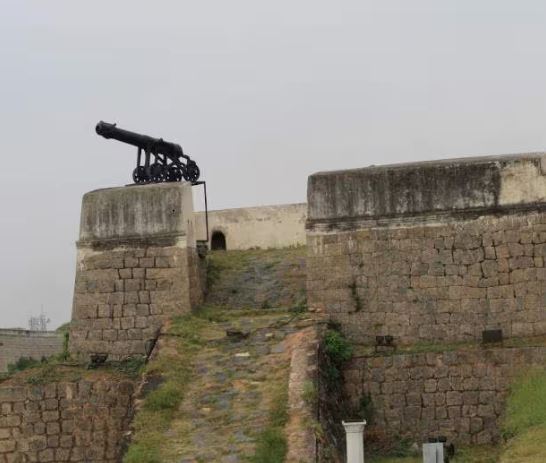
By Mohammed Atherulla Shariff
‘It is far better to live like a lion for a day than to live like a jackal for a century’. This great saying of Tipu Sultan, the Tiger of Mysore, is demonstrated in Gaza today, as if the spirit of the valiant Sultan has transferred into the courageous fighters of Hamas. A sheer coincidence at the time of Tipu’s birth anniversary this month (10th November).
The uniqueness in Tipu’s life and death is the continuation of his friends and foes. The chain is not ending even though two centuries have passed since his martyrdom. The irony is that the country and the people for whom he laid down his life at the age of just 49 years, fighting all through against their enemies, raise questions about his integrity and are bent upon to erase his name from the minds.
The vote bank politics has landed the present Congress government in Karnataka headed by Siddaramiah into ‘once bitten twice shy’ situation which abstained from celebrating Tipu’s birth anniversary this time, even though the same factor had prompted it during the first inning.
It was more than appropriate to name the Bangalore International Airport after the great Sultan since it is situated at just a stone throw distance from his birth place, Devanhalli. But the people at the helm of affairs then simply declined.
Tipu is acknowledged as the ‘pioneer of rocket technology in India’. But we are yet to name a missile after his name.
Tipu was a scholarly person and promoted education in his country. He was fluent in several languages, including Kannada, Persian, Arabic, and French. The library of Tipu Sultan had a huge collection of translations of world literature. Yet no university or a research centre is attributed to him.
In 2012 a Central minister for Minorities Affairs in UPA government had announced establishment of Tipu University in Srirangapatna, the capital of the late Sultan. Criticisms flooded soon and the announcement was washed away.
However, some private bodies have named their institutions after him in Karnataka like Tipu Shaheed Polytechnic Hubli and Sultan Shaheed institutions in Mysore.
Controversies Created
A lot of controversies have been concocted to prevent due recognition extended to Tipu Sultan in Karnataka itself, let alone other parts of India. Several brilliant minds are after this great job.
The history of the great empire of Tipu and his numerous astonishing contributions are being erased from history textbooks in a phased manner. No matter which government comes to power.
Even the roads, circles and streets named after Tipu are being pushed into controversies and tried to be changed. Yadgir and Basavakalyan towns of Karnataka are few examples. Thanks to the hatred generated in the atmosphere by communal outfits.
It thus becomes very essential to remind the readers of some of the important contributions of the valiant Sultan at the time of Tipu’s birth anniversary.
Tipu Sultan was a powerful warrior, a well-educated man and a learned ruler. He is known for his military prowess and his efforts to modernise the administration and military of the Kingdom of Mysore.
His visionary father Hyder Ali brought him up with special care. He was imparted with various skills like shooting, riding and swordsmanship under the guidance of military official Ghazi Khan. He took to the battlefield at a very tender age. At 15, Tipu along with a force of only a few thousand soldiers forced the King of Malabar to surrender to Hyder Ali.
Strategic and Military Preparedness
In order to check the march of the British, Tipu used another European power to his advantage. He established close relationship with the French in India and modernised his army with their help.
His hubs took advantage of India’s vast tradition of making and manipulating ferrous metals like iron and steel to produce the predecessor of the modern rocket that was more effective than the “firecracker-type missiles” utilised by the Chinese. It was the most notable aspects of Tipu Sultan’s armed forces. He had a rocket corps known as the Mysorean Rockets, which he used to significant effect in battles against the British.
He made iron tubes packed with explosives, hoisted them on flags or bamboo poles, and installed them on ramps for increased accuracy and range. In addition to his military strength, Tipu Sultan was known for his innovative tactics and strategy. He used guerrilla tactics and surprise attacks to keep his enemies off-balance.
He authored a military handbook (Fathul Mujahidin) that explains how the rockets work.
Economic Prosperity
Tipu set up banking networks and cooperatives. The capital was raised from the general public, and the principal was retained and returned annually with profit share, i.e. nafa. He built trading houses for Mysore items at various places.
In order to develop indigenous market and to prevent the Europeans, particularly the British, from draining money out of India, Tipu chose the barter system and cashless transactions. The Sultan even barred local merchants from trading with the Company and prohibited the export of sandalwood, pepper, and cardamom through his kingdom’s ports. He developed dockyards in Mangalore, Wajedabad, and Molidabad. His ideas, however, have yet to come to reality.
Silk, Sandal, Sugar and Gold
Tipu ensured that the state would monopolise some critical industries. These included the production of sugar, salt, iron, tobacco, sandalwood, and the extraction of silver, gold, and precious stones.
The Sultan established new markets and encouraged the growth of industries such as of silk, sandalwood, and iron. He also brought in experts from all around the world to help grow Mysore’s silk cottage sector.
During his reign, Tipu Sultan instituted a variety of administrative changes, including currency and land revenue system, which encouraged the rise of the Mysore silk industry. He did away with the use of middlemen in the collection of land tax.
He was fond of making handwritten observations of foreign countries. He invited Persians to come to India and educate the artisans on how to make wooden toys. These toys are famously known as Channapatna toys.
Technological Advancement
Tipu recognised the power of technology when combined with discipline and established ‘Taramandalpets’ i.e. innovation hubs (similar to modern-day tech parks) in Bengaluru (near the present Silver Jubilee Park road), Chitradurga, Srirangapatna, and Bidanur.
Ships docking at his Mangalore port had numerous devices such as telescopes and barometers.
Infrastructure Development
Tipu Sultan laid the foundation for the Krishnaraja Sagar Dam in Mandya. Tipu’s industrial belt stretched across the Mysore State, from Bengaluru to Srirangapatna, providing work for citizens everywhere, and even if the British attacked one centre, he retained control of others.
A great visionary, a valiant ruler, a technology lover, ahead-of-time scholar, a true son of the soil succumbed to cunningness then and is being laid to rest by deceit now. But the spirit of Tipu Sultan is alive and is being witnessed in Middle Eastern deserts.




